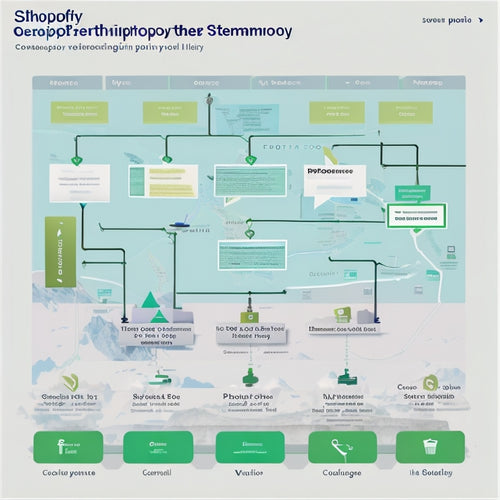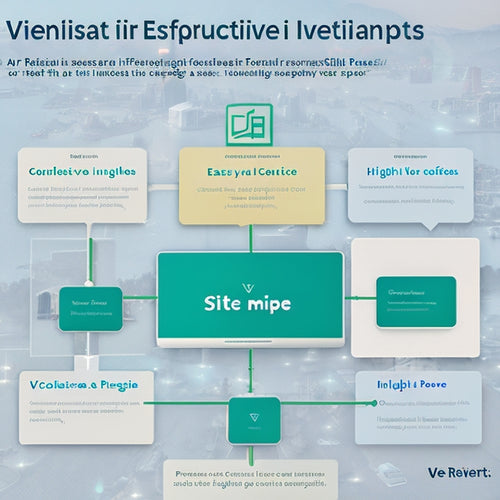
Mastering E-Commerce Compliance for Business Success
Share
Mastering e-commerce compliance is essential for business success, as it establishes a trustworthy brand, overcomes compliance challenges, and addresses legal considerations. A compliant foundation showcases company information, ensuring all legal requirements are met. Addressing regulatory requirements, including GDPR, PECR, PCI-DSS, and WCAG compliance, is vital. Ongoing efforts are necessary to maintain compliance, requiring a proactive approach, regular policy updates, employee training, and prioritizing compliance and customer satisfaction. By understanding the complexities of e-commerce compliance, businesses can avoid costly penalties, establish a competitive edge, and foster long-term success, and a deeper understanding of these strategies can lead to even greater benefits.
Key Takeaways
• Building a compliant e-commerce foundation establishes a trustworthy brand and showcases company information.
• Navigating regulatory requirements, such as GDPR and PCI-DSS, ensures legal considerations are met and avoids costly penalties.
• Ensuring ongoing compliance involves a proactive approach, regular policy reviews, and employee training for long-term sustainability.
• Addressing legal considerations, including customized terms and conditions, informs customers about payment and delivery.
• Mastering e-commerce compliance drives growth, fosters trust and loyalty, and provides a competitive edge.
Building a Compliant E-commerce Foundation
Building a compliant e-commerce foundation is an essential initial stage in developing a successful online business. It establishes the tone for a trustworthy and customer-centric brand. This foundation is crucial in overcoming compliance challenges and addressing legal considerations that can impact business operations.
A compliant e-commerce foundation guarantees that all essential legal requirements are met, safeguarding both the business and its customers. It entails showcasing company information, crafting customized terms and conditions, informing customers about payment and delivery particulars, and securing website accessibility.
Navigating Regulatory Requirements
In the ever-evolving e-commerce landscape, maneuvering regulatory requirements is a critical component of ensuring business legitimacy and avoiding costly legal pitfalls. Businesses must stay ahead of compliance challenges by staying informed about regulatory updates.
| Compliance Aspect | Regulatory Requirement |
|---|---|
| Data Security | GDPR compliance |
| User Consent | PECR and GDPR compliance |
| Payment Processing | PCI-DSS compliance |
| Accessibility | Web Content Accessibility Guidelines (WCAG) |
Ensuring Ongoing Compliance and Success
As e-commerce businesses navigate the complexities of regulatory compliance, sustained efforts are necessary to guarantee ongoing success and mitigate the risks associated with non-compliance.
Ensuring ongoing compliance and success requires a proactive approach, focusing on continuous improvements and long-term sustainability. Regularly reviewing and updating policies, procedures, and systems is essential to staying ahead of evolving regulatory requirements.
Additionally, investing in employee training and awareness programs helps to foster a culture of compliance within the organization. By prioritizing compliance and customer satisfaction, e-commerce businesses can build trust and loyalty, ultimately driving long-term success and growth.
Frequently Asked Questions
How Do I Ensure Website Accessibility for Visually Impaired Customers?
To guarantee website accessibility for visually impaired customers, implement screen reader compatibility and text-to-speech software, provide Braille translations, and include alt text descriptions for images, guaranteeing equal access to online content.
Can I Use a Generic Terms and Conditions Template for My E-Commerce Site?
The allure of a generic terms and conditions template: a tempting shortcut to compliance. But beware, dear entrepreneur, for template limitations can lead to legal implications. Instead, opt for customized solutions that address your unique business needs and compliance requirements.
What Is the Best Way to Handle Customer Data Breaches and Notifications?
In the event of a customer data breach, promptly notify affected individuals and regulatory authorities, ensuring transparency and compliance with legal implications, to maintain customer trust and protect your reputation through robust data protection measures.
Do I Need to Comply With GDPR if I Only Sell Within My Country?
Even without international sales, GDPR compliance is essential if you process personal data of EU residents, as data can cross borders. Non-compliance can lead to severe legal implications, emphasizing the importance of GDPR adherence for data protection.
How Often Should I Review and Update My E-Commerce Site's Privacy Policy?
To guarantee ongoing legal compliance, review and update your e-commerce site's privacy policy at least annually, or whenever significant changes occur, to reflect evolving legal obligations and compliance updates.
Related Posts
-

How Do I Add Social Media Handles to My Shopify Store
This article aims to provide an informative and strategic guide on how to add social media handles to a Shopify stor...
-

How Does Shopify Generate a Sitemap
This article examines the process of sitemap generation on the Shopify platform. It explores the benefits of Shopify...
-

Does Having a Sitemap Help SEO
This article examines the potential impact of sitemaps on search engine optimization (SEO) practices. It explores th...


